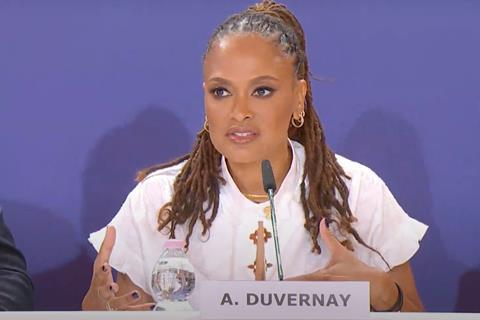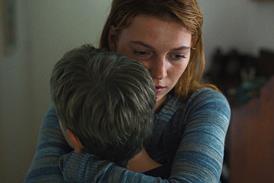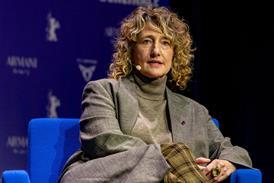
Ava DuVernay has highlighted the inequalities that continue across the film circuit saying that Black filmmakers are told “you cannot play international film festivals.”
Speaking at the press conference for her Venice title Origin – through which she becomes the first US Black female filmmaker to have a film in Competition at the festival – DuVernay said, “It’s very rare for two Black filmmakers [herself and producer Paul Garnes] to make a film that leaves the country [the US]. For Black filmmakers, we’re told that people who love films in other parts of the world don’t care about our stories and don’t care about our films.”
“This is something that we’re often told – you cannot play international film festivals, no-one will come, people will not come to your press conference, people will not come to the P&I screenings, there will not be interest in selling tickets – you will not even get into this festival, don’t apply.”
“I can’t tell you how many times I’ve been told, ‘don’t apply to Venice, you won’t get in, it won’t happen’” added DuVernay, who is screening at the festival for the first time.
Research by Screen in 2021 showed that Black filmmakers make just 1% of competition titles at major festivals. Venice had no films by Black filmmakers in its 2018, 2019 or 2021 competitions; with one last year (Alice Diop) and one this year (DuVernay).
“That’s a door open that I trust and hope the festival will keep open,” said DuVernay. “It acknowledges an absence for 80 years [the number of festival editions] – as intelligent people we should be able to say ‘this happened, and now what’s next.’”
Producer
DuVernay also thanked Venice moderator and programmer Giulia D’Agnolo Vallan for a question about her producing work. “So often as a Black woman filmmaker, the questions that I’m asked are about race, are about being a woman, are about everything but the filmmaker part,” said DuVernay. “When I see interviews with my counterparts who are not Black and who are not women, they have lots of questions about craft and producing.”
Origin, which premieres this evening (Wednesday, September 6) in Venice, looks at the caste system that has shaped the US, and chronicles how lives today are defined by human hierarchies. It a dramatisation of the non-fiction book Caste: The Origins Of Our Discontents by Isabel Wilkerson.
DuVernay addressed why she chose to open and close the film with images of Trayvon Martin, the 17-year-old Black boy who was shot and killed in February 2012. “That became a touchpoint for us, a point of commonality to be so emotionally connected to his death, that it was my choice and my honour to open and close the film on his face,” said DuVernay. “The modern movement for Black lives, you can trace to the murder of Trayvon Martin. In a contemporary context, he became the case that started to animate conversations around it.”
Independent distributor Neon signed a US deal for Origin yesterday (September 5). The project originated with Netflix, for whom DuVernay had directed miniseries When They See Us, before the streamer dropped out at the start of this year. The film was produced by DuVernay’s Array Filmworks, with financing from US firm J4A.
DuVernay said she was glad it ended up as an independent film. “I don’t feel we would’ve had the cast we had if this film had remained in the studio system,” said DuVernay, with Aunjanue Ellis and Jon Bernthal leading the cast alongside Audra McDonald, Niecy Nash-Betts, Vera Farmiga and Nick Offerman. “The studio system is a place where I’ve worked and made projects that I’m proud of; but there is an aspect of control over who plays what. There is an idea about who makes money, who attracts attention; and sometimes that sits at odds with who might be the best person for the part.”
Although she did not directly address the ongoing WGA and SAG-AFTRA strikes, DuVernay did say the cast consists of a combination of non-professional actors and those in the actors’ guild. “It’s populated with meat-and-potatoes, blood sweat and tears working actors who are very respected,” said DuVernay. “It gets into this idea of the value we place on certain artists, based on what corporations say – who is more valuable and who’s not.
“Thank goodness we made this film independently, and we were able to handpick everyone.”
Venice continues until Saturday, September 9.

























No comments yet